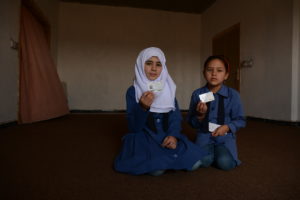Via International Human Rights Clinic
By Katherine Gonzalez, J.D. ’17

Two Syrian schoolmates hold up their MoI cards. Credit: Norwegian Refugee Council/Lian Saifi
It may be difficult to believe that a simple piece of paper can carry so much weight. But for Syrian refugees living in host communities in Jordan, marriage certificates, birth certificates, and government-issued identity cards are essential to securing basic human rights.
Several months ago, I traveled with a team from the International Human Rights Clinic to interview dozens of Syrian refugee families about their experiences with obtaining these documents in Jordan. Like the vast majority of Syrian refugees in Jordan, these families lived outside of refugee camps, their legal status dependent on whether they had new government-issued identity cards, otherwise known as “MoI cards.” Without the cards, refugees lived in situations of legal uncertainty, without access to essential services, and at risk of arrest, detention, forced relocation to refugee camps, and possible refoulement.
The families we interviewed described a variety of experiences, but one theme was common throughout: lacking proper documentation can have cascading consequences for Syrians who already occupy a marginalized and vulnerable position.
For one Syrian mother, getting a new MoI card for her infant son, who was born in Jordan, seemed nearly impossible. In order to get the card, she needed proof of identity for her son, in the form of a birth certificate issued by Jordanian authorities. But she couldn’t get the birth certificate until she got a marriage certificate. And she couldn’t get the marriage certificate because the woman and her husband, who wed in Syria two years prior, could not provide sufficient proof that they had been married in Syria.
Filed in: Clinical Spotlight
Contact Office of Clinical and Pro Bono Programs
Website:
hls.harvard.edu/clinics
Email:
clinical@law.harvard.edu